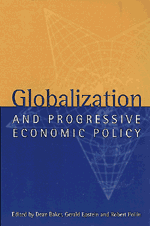Book contents
- Frontmatter
- Contents
- List of figures
- List of tables
- List of contributors
- Editors' acknowledgments
- 1 Introduction
- I The IMF, the World Bank, and neo-liberalism
- 2 The revival of the liberal creed: the IMF, the World Bank, and inequality in a globalized economy
- Comment by Arthur MacEwan
- 3 India: dirigisme, structural adjustment, and the radical alternative
- Comment by Keith Griffin
- II Foreign direct investment, globalization, and neo-liberalism
- III Globalization of finance
- IV Trade, wages and the environment: North and South
- V Migration of people in a global economy
- VI Globalization and macroeconomic policy
- Bibliography
- Index
2 - The revival of the liberal creed: the IMF, the World Bank, and inequality in a globalized economy
Published online by Cambridge University Press: 04 August 2010
- Frontmatter
- Contents
- List of figures
- List of tables
- List of contributors
- Editors' acknowledgments
- 1 Introduction
- I The IMF, the World Bank, and neo-liberalism
- 2 The revival of the liberal creed: the IMF, the World Bank, and inequality in a globalized economy
- Comment by Arthur MacEwan
- 3 India: dirigisme, structural adjustment, and the radical alternative
- Comment by Keith Griffin
- II Foreign direct investment, globalization, and neo-liberalism
- III Globalization of finance
- IV Trade, wages and the environment: North and South
- V Migration of people in a global economy
- VI Globalization and macroeconomic policy
- Bibliography
- Index
Summary
Half the people and two-thirds of the countries in the world lack full control over their own economic policy. Expatriate “experts” managed by industrial country nationals and based in Washington, D.C. regulate these countries' macroeconomics, investment projects, and social spending. The principles guiding these instructions from afar are even known as a “Washington consensus” (after Williamson 1989).
The foreigners who fly in with policy packages for developing and post-socialist countries staff two international agencies – the World Bank and the International Monetary Fund (IMF). Arguably, many actions that the IMF and the World Bank “recommend” to governments are intellectually ill founded and counterproductive in practice. However, their suggestions are heeded for several reasons. The two institutions are backed by the United States and other economic powers such as England and (less enthusiastically) Japan.
Their emissaries arrive in local capitals with substantial hard currency credit lines in hand – a strong incentive for the authorities to take their proposals to heart. Finally, the proposals are based on the “neo-liberal” or “market-friendly” brand of policy analysis that has become intellectually predominant over the past dozen years. In some cases – notably Mexico's since 1982 – local policy makers have been even more enthusiastic about neo-liberalism than are their friends from Washington.
Such “globalization” of economic policy is not entirely new. Argentina's transformation of its central bank in the 1990s into a “currency board” replicates ancient monetary customs of the British colonies, and the Princeton “money doctor” E.W. Kemmerer's missions of the 1920s closely resembled those of the IMF today.
- Type
- Chapter
- Information
- Globalization and Progressive Economic Policy , pp. 37 - 63Publisher: Cambridge University PressPrint publication year: 1998
- 21
- Cited by



